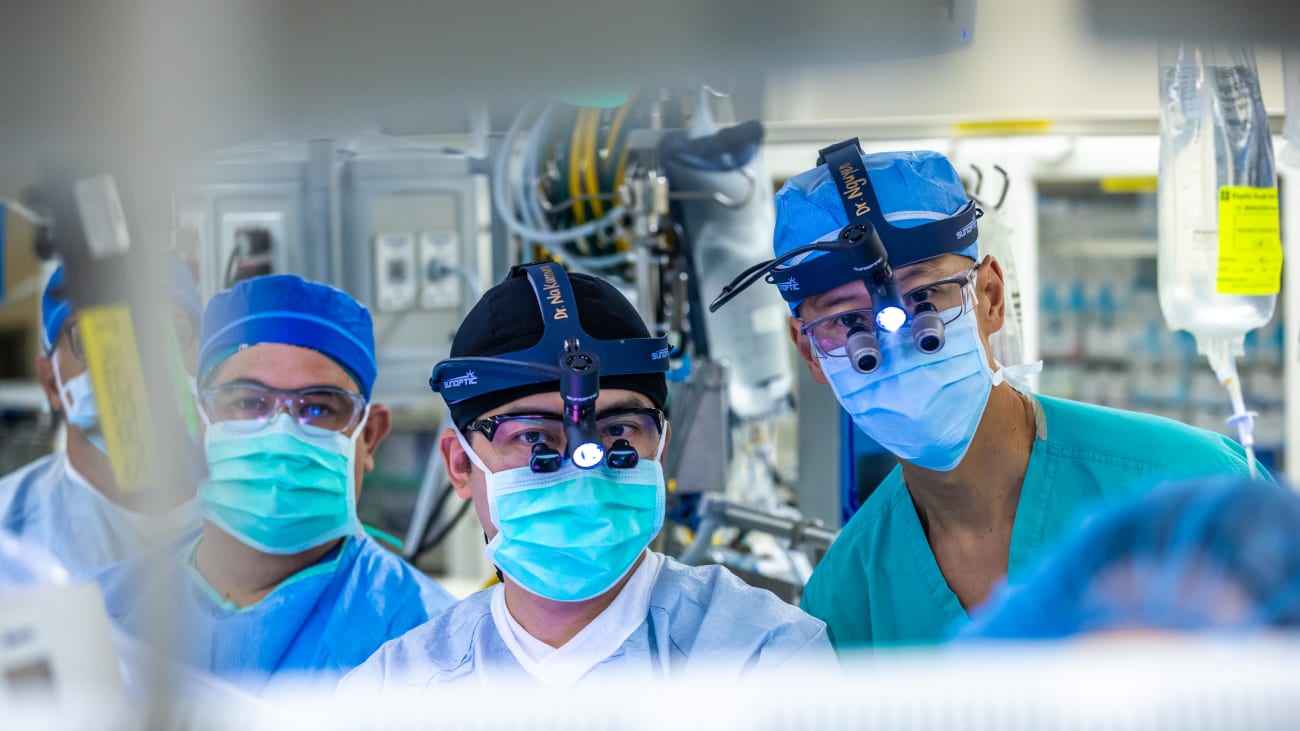

The stethoscope around your neck and the scalpel in your hand have been joined by a companion who never sleeps, never objects and can process thousands of medical studies in a fraction of the time it takes you to review one medical record. Artificial intelligence has arrived in medicine. Yet is it amplifying your clinical expertise or subtly undermining your patient care?
“Superpower or Kryptonite — AI Replacing Doctors” was the topic discussed recently by Tom Nguyen, M.D., at Baptist Health’s Jose “Pepe” Alvarez Jr., M.D., Memorial Lecture on Vascular Disease. Dr. Nguyen is chief medical executive, director of minimally invasive valve surgery and the Barry T. Katzen Endowed Chair at Baptist Health Miami Cardiac & Vascular Institute. He is also an early adopter and proponent of AI.
“There’s a quote I love from Jesee Ehrenfeld, president of the American Medication Association,” he told the audience. “‘AI will never replace physicians… but physicians who use AI will replace physicians who don’t.’”
The sentiment resonates deeply with Dr. Nguyen, who understands AI’s ability to flag potential drug interactions, identify subtle patterns in imaging that could save lives and even predict which patients are likely to deteriorate before clinical signs become obvious. But beneath his optimism lies a more complex reality: Is there a possibility that AI could make you over-reliant on its diagnostic accuracy, distance you from clinical thinking or even introduce an error into your work?
According to Dr. Nguyen, AI is improving the administrative side of healthcare by streamlining operations and enhancing efficiencies across multiple domains, including:
· Helping map out complex workflow patterns and improve scheduling efficiencies for specialized facilities like the cath lab and OR, maximizing equipment and staff utilization and reducing patient wait times.
· Providing more-accurate and time-sensitive documentation and generating detailed op and procedure notes.
· Consolidating and analyzing large amounts of patient data, supporting evidence-based decision-making and clinical trials, identifying trends and predicting outcomes.
On the clinical side, AI is already:
· Seeing what the naked eye cannot — for example, EKG abnormalities and minuscule findings on imaging studies.
· Using preoperative imaging to create 3D models of patient anatomy and to optimize surgical approaches.
· Providing an accurate needle count in the OR by detecting, identifying and tracking each needle used, preventing miscounts, reducing the need for repeat counts and ensuring patient safety.
· Helping train the next generation of physicians using AI-enhanced platforms — for example, teaching robot-assisted surgical skills in a controlled learning environment not dependent upon patient availability and the inherent risks of practicing on real patients.
Personally, Dr. Nguyen is involved in several AI initiatives. One is the development of digital stethoscopes and ultrasound machines used to detect heart problems. Another is the creation of small wearable devices that track cardiac patient metrics that could predict a post-surgical complication before it is detectable by humans.
With all of its benefits, however, AI comes with a cautionary warning — even from its pioneers. The proliferation of deepfakes is making it increasingly difficult to distinguish fact from fiction, criminals are exploiting AI for illicit purposes and healthcare is vulnerable to a potential patient data breach. Additionally, there are concerns that AI will erode our critical thinking and learning skills.
“AI is a double-edged sword,” he says. “You can train it to do what you want it to do, but how do we govern and regulate it? We need that governance, not only at a local or a national level, but at a global level.”
At Baptist Health, Dr. Nguyen and Barry Katzen, M.D., founder and chief medical executive emeritus of Miami Cardiac & Vascular Institute, are part of an AI governance initiative, helping create guidelines and oversight for its use within the health system.
“The founders of AI are saying it will change the world in a way more profound than electricity,” Dr. Nguyen says. “It may take another five to 10 years before it can do 70 percent of what we do and 25 years before it will do 90 percent of what we do. But there is no doubt that along the way it will transform patient care, and throughout the process, our goal will remain the same — to deliver the best care we can to our patients.”
The Jose “Pepe” Alvarez Jr., M.D., Memorial Lecture on Vascular Disease is offered each year as a tribute to the achievements of Dr. Alvarez, the first board-certified vascular surgeon in South Florida and the medical director of vascular surgery at the Institute at the time of his death in 2006 from brain cancer. He was 53 years old.

